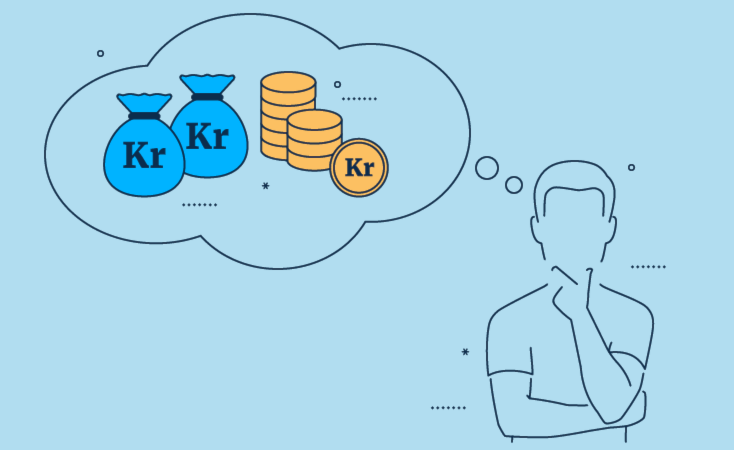Money
Money is essential in an economy. It is used to make payments and save, and provides a unit of account, ie a standard measure of value. However, if money is to perform these functions, the public must have confidence that its value is stable.
Links
How much money is there?
The money supply in the Norwegian economy is always changing and Statistics Norway provides monthly updated monetary aggregates. However, there is generally quite a lot of money in circulation, and the money supply is often divided into subcategories.
So-called base money consists solely of central bank money, which is money issued by the central bank as either banknotes, coins or banks' deposits in Norges Bank. In 2022, base money averaged approximately NOK 77bn. Notes and coins in circulation accounted for about one half and banks' deposits in Norges Bank the other.
If we include customers' bank deposits, also referred to as deposit money, the money supply averaged over NOK 2 800bn in 2022. In other words, there is far more deposit money in circulation than central bank money.
How much money is there in Norges Bank?
To ensure that there will always be sufficient notes and coins to meet demand and the need for replacement, Norges Bank maintains a contingency stock of notes and coins in its vault. The amount of money in the vault is secret but sufficient for a contingency when many people want access to cash. However, this money is excluded from the money supply as long as it is in Norges Bank's vault. Only when put into circulation is money counted as part of the money supply in the Norwegian economy.
In addition to physical cash, Norges Bank also receives deposits from banks (also referred to as central bank reserves). Norges Bank seeks to maintain the sum of these reserves at around NOK 35bn.
At the same time, Norges Bank is the government's bank, and the Norwegian government has considerable amounts of money in its accounts with Norges Bank. In 2022, deposits used for public payments and receipts amounted to a little more than NOK 300bn. The government also has a savings account in Norges Bank: The Government Pension Fund Global (GPFG), also called the oil fund or the fund, is a krone account in Norges Bank matched by foreign investments. At the end of 2022, this account amounted to over NOK 12 000bn.
Gold and silver used to be an important part of the Bank's holdings. This is no longer the case. With only seven gold bars and 3.5 tonnes of gold coins, the Bank's gold reserves are now primarily viewed as a historical curiosity.
To meet its international commitments and other contingency needs, Norges Bank's reserves are invested in foreign currency. Since these investments are in deposits and securities outside of Norway, they are not held in Norges Bank, but they are still owned by Norges Bank. At the end of 2022, these foreign exchange reserves amounted to approximately NOK 600bn.
What does it mean that cash is legal tender?
According to the Central Bank Act, cash in the form of banknotes and coins from Norges Bank are legal tender. This means that no one can be denied the option of settling a payment obligation using notes and coins.
Norwegian banks are also obliged to accept notes and coins from their customers and make deposits available in notes and coins upon request.
Can shops refuse cash?
Cash in the form of banknotes and coins from Norges Bank are legal tender in Norway. But sometimes it can be difficult to determine how the obligation to accept cash payment should be fulfilled.
For example, it would be difficult for an online retailer to accept cash payments when purchases are made online from home. But whether this would also mean that shops in a shopping centre should also be permitted to refuse cash payments is a point of disagreement.
Norges Bank has therefore called for a clarification of the relevant legislation.
Will Norges Bank create a central bank digital currency (CBDC)?
A CBDC is generally accessible electronic money issued by a central bank denominated in the official unit of account. A project is currently underway in Norges Bank to assess whether a CBDC should be introduced in Norway. For more updated information follow this link
